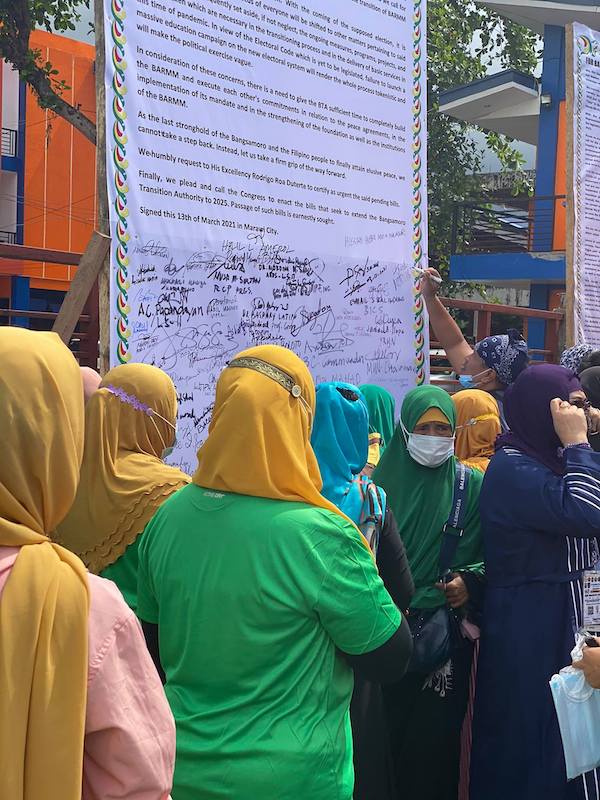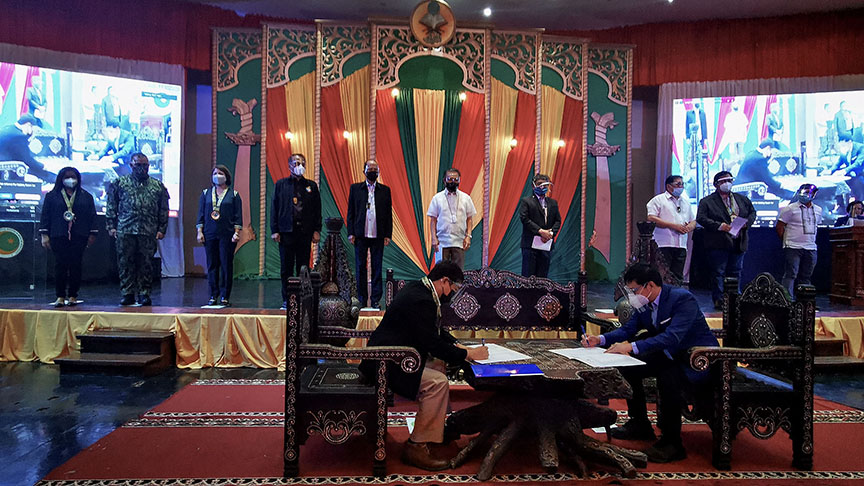KORONADAL CITY (MindaNews / 23 March) – Poll watchdogs urged Congress on Tuesday to desynchronize the parliamentary election in the Bangsamoro Autonomous Region in Muslim Mindanao (BARMM) from the 2022 national and local elections.
Their call came amid the petition to extend the transition period in the Bangsamoro region, which recently gained the support of one million signatories.
 Participants of a peace caravan sign a manifesto during a short stop in Matling, Malabang in Lanao del Sur on Saturday, 12 March 2021, urging President Rodrigo Duterte to certify as urgent the bills seeking to extend the transition period in the Bangsamoro Autonomous Region in Muslim Mindanao for another three years from 2022 to 2025. (Photo courtesy of Ariel Amerol, Bangsamoro Development Agency)
Participants of a peace caravan sign a manifesto during a short stop in Matling, Malabang in Lanao del Sur on Saturday, 12 March 2021, urging President Rodrigo Duterte to certify as urgent the bills seeking to extend the transition period in the Bangsamoro Autonomous Region in Muslim Mindanao for another three years from 2022 to 2025. (Photo courtesy of Ariel Amerol, Bangsamoro Development Agency)
Lawyer Rona Ann Caritos, executive director of the Legal Network for Truthful Elections or Lente, said that synchronizing the BARMM polls with the 2022 national and local elections might not augur well for the new Bangsamoro region’s quest for a new breed and brand of governance.
“If the national and BARMM parliamentary elections will be simultaneously held, the traditional personality and party-driven politics will likely drown out the new but deserving political parties formed just for the BARMM polls,” she said in Filipino. “They are entirely two different political exercises and should not be held together.”
Speaking before the online “Usapang Eleksyon sa Bangsamoro” forum organized by the Institute for Autonomy and Governance, a think tank based in Cotabato City, Caritos noted that voters in the Bangsamoro will still be voting for their district representatives plus the political parties that will have seats in the new parliamentary system of government.
Salic Ibrahim, executive director of the Maranao People Development Center, Inc. or Maradeca, warned that synchronizing the national and local elections with the Bangsamoro parliamentary polls will be distractive to BARMM voters considering they are voting a new system for the first time.
“The Bangsamoro voters will likely experience an information overload if the traditional politicians running for national and local positions will campaign at the same time with the regional parties seeking seats in the Bangsamoro parliament,” he noted.
Ibrahim feared that running the national and local elections together with the Bangsamoro parliamentary polls might be problematic considering that the latter is a new political exercise for voters in the region.
Eric Alvia, secretary general of the National Movement for Free Elections (Namfrel), expressed support for the desynchronization of the Bangsamoro parliamentary elections with the national and local elections.
“Practically, it will not make sense because it will create logistical problems,” he added.
The Commission on Elections has set the filing of certificates of candidacy for national and local posts for the May 9, 2022 on October 1 to 8, 2021.
The official election period has been set from Jan. 9, 2022 to June 8, 2022, with the campaign period for national positions set for Feb. 8, 2022 to May 7, 2022. National positions include president, vice president, senators and party list groups.
On the other hand, the campaign period for local positions has been set from March 25, 2022 to May 7, 2022. Local positions include House of Representatives members, regional, provincial and city and municipal officials.
Calls for extension of transition period
The Bangsamoro Transition Authority (BTA), the interim body governing the Bangsamoro region, is set to end its mandate on June 30, 2022.
The BTA sought the extension of the transition period for another three years to 2025, a move backed by peace advocates in Mindanao, which recently gathered one million signatures for its petition to President Rodrigo Duterte to certify as priority bill the measures pending before Congress to extend the transition period in the BARMM.
Proponents of the measure to extend the transition period argued that the BTA needs more time to implement the provisions of the Comprehensive Agreement on the Bangsamoro (CAB), given, among others, the disruptions brought by the COVID-19 pandemic.
 Interior and Local Government Secretary Eduardo Año and Interior and Local Government Minister Naguib Sinarimbo lead the ceremonial turnover of Cotabato City under the care of the Bangsamoro Autonomous Region in Muslim Mindanao on Tuesday (15 December 2020). MindaNews photo by FERDINANDH CABRERA
Interior and Local Government Secretary Eduardo Año and Interior and Local Government Minister Naguib Sinarimbo lead the ceremonial turnover of Cotabato City under the care of the Bangsamoro Autonomous Region in Muslim Mindanao on Tuesday (15 December 2020). MindaNews photo by FERDINANDH CABRERA
The CAB is the final peace deal between the government and the Moro Islamic Liberation Front (MILF) signed in 2014 after 17 years of negotiations.
The key component of the CAB is the creation of the Bangsamoro region, which was realized two years ago following the ratification of Republic Act 11054 or the Organic Law for the BARMM, more popularly called the Bangsamoro Organic Law (BOL).
The MILF, which dominates the BTA, formed the United Bangsamoro Justice Party (UBJP) in 2014 as its vehicle to run for elections in the envisioned Bangsamoro region.
Interim Chief Minister Ahod Ebrahim, popularly known as MILF chair Al Haj Murad Ebrahim, supported the extension of the transition period.
His leadership over the Bangsamoro region is anchored on the principle of “moral governance,” to promote honesty, integrity and efficiency in serving the public.
Lack of election code
To date, however, the BTA has yet to pass the Bangsamoro election code.
Caritos urged the immediate passage of the region’s election code, which is one of the priority legislative measures of the BTA, noting it is already delayed with the looming election season.
She said that the parliamentary elections in the BARMM should not be conducted if the region will not have its own electoral code, since the existing election code of the country does not provide for parliamentary polls.
Alvia said it is important for Congress to decide whether to extend the transition period while BTA is working parallel to pass its election code.
“How can you run an election when you don’t have the rules yet?” he asked. (Bong S. Sarmiento / MindaNews)
